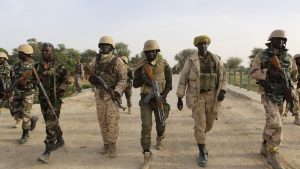Monitoring, Evaluation, Accountability and Learning (MEAL) Officer at Malaria Consortium (6 Openings)

Malaria Consortium is one of the world’s leading non-profit organisations specialising in the comprehensive prevention, control and treatment of malaria and other communicable diseases among vulnerable and under privileged populations. We increasingly find our work on malaria can be effectively integrated with other similar public health interventions for greater impact and therefore expanded our remit to include child health and neglected tropical disease interventions.
We are recruiting to fill the position below:
Job Title: Monitoring, Evaluation, Accountability and Learning (MEAL) Officer
Locations: Jigawa, Kaduna, Kano, Katsina, Lagos & Yobe
Department: Technical
Length of contract: 5- years
Role type: National
Grade: 8
Travel involved: In-country
Child safeguarding level: Non Focal Point
Reporting to: State Team Lead
Dotted line manager: Senior MEAL Specialist
Country and Project Background
Malaria is highly endemic in Nigeria and it remains one of the leading causes of childhood and maternal morbidity and mortality in the country. Nigeria is deeply committed to making progress towards the achievement of the Sustainable Development Goals and it recognizes the fact that, without firm efforts to control malaria, achievement of the targets related to child mortality, maternal mortality, and reducing the burden of communicable disease will not be possible. Malaria therefore constitutes a significant development challenge for Nigeria. Interventions for reducing malaria burden in the country are documented in the national malaria strategic plan with Government taking the lead in its implementation with the support of all the RBM partners.
The DFID funded and Malaria Consortium led malaria programme, SUNMAP, provided technical assistance and other support to the Nigeria National Malaria Elimination Programme (NMEP) covering the period 2008 to 2016. The anticipated follow on project, SUNMAP2 has been designed to strengthen the management and technical capacity of NMEP, State Malaria Elimination Programme (SMEP) and their stakeholders to drive the implementation of the National Malaria Strategic Plan, 2014 to 2020 and achieve its ambitious targets. This will include short term technical assistance and technical assistance embedded in NMEP in key areas of programme management, evidence generation and use, and capacity building across all project outputs and ultimately reducing Nigeria’s malaria burden and strengthening the Government of Nigeria’s health systems capacity to ensure long term programme and impact sustainability.
Job Purpose
- To provide technical support and oversight to all state-level Research, Monitoring, Evaluation, Accountability and Learning activities of the programme under the guidance of the state Team Lead and Senior MEAL Specialist.
Scope of Work:
- The Senior Monitoring, Evaluation, Accountability and Learning (MEAL) Officer will serve as the main focal person for all Research, MEAL (Monitoring, Evaluation, Accountability and Learning) activities which include data validation, DQA, coordination meetings, capacity building in data management and supportive supervisory visit to strengthen health management information system in SuNMaP2 programme in the state.
- S/he will assist and report to the state team lead and other State technical officers regarding the monitoring and evaluation of project activities.
Key Working Relationships:
- The officer working under the line-management of the State team Lead and in close collaboration with the state, LGA, community actors, stakeholders and partners, would deliver aspects of the programme as per the specified job tasks and expected deliverables. S/he will have dotted line management to the Senior MEAL Specialist.
Key Accountabilities (per cent of time spent on each area)
Technical contributions 50%:
- Develop and implement a state-specific M&E plan drawing from the bigger programme M&E plan for the programme.
- Plan and implement M&E activities related to SuNMaP2 in the approved work plan under the guidance of the State team lead.
- Serve as the focal person for all monitoring and evaluation related work for the programme within the state.
- Institute and implement a Data Quality Assessment (DQA) plan to ensure high quality data are available on a regular and timely basis for programmatic decision making
- Manage the information-gathering process for results and performance reports, in addition to other briefings, summaries, papers, presentations, etc. for various audiences as needed. Coordinate the documentation of SuNMaP2 activities in form of reports and ensure proper archiving of such for easy access and reference
- Assist program and State team leads to develop robust monitoring plans for quantitative and qualitative reporting on programme performance indicators.
- Adapt and maintain a high-quality database for the project in line with the regional standards.
- Contribute to work plans, sub-agreements, budgets, pipelines, technical reports, and deliverables.
- Routinely monitor project performance against targets and prepare periodic reports on M&E activities for the programme.
- Participate in project assessments, evaluations and design including development of survey protocols.
Program Management (10%):
- Support SMoH staff with coordinating program management activities, by ensuring that the recommended coordination meetings hold at the LGA and state levels.
- Work with the state and LGA Ministry of Health staff to ensure that reports are obtained from all health facilities within the state through appropriate state-specific mechanisms.
- Participate in regular monitoring and supervisory visits to the GF-supported health facilities, and ensure that action plans are developed for identified gaps.
- Support health facilities with ensuring that all items in the action plans are addressed and all outstanding gaps are closed.
Accountability (10%):
- Support programme staff to engage key populations in monitoring and evaluating program performance and to incorporate participatory methods into M&E systems in the State.
- Orient programme staff and partners on the basic principles and practices of beneficiary accountability in the State.
- Support the development and implementation of feedback and response channels to reflect the preferences of community members and beneficiaries.
- Ensure that beneficiary feedback are adequately documented, addressed, analysed, and utilized by program teams.
Knowledge Management and Learning (20%):
- Ensure that state M&E and program teams regularly review and adjust M&E plans and tools accordingly in the light of changes and needs in the field context based on monitoring data and reflection sessions.
- Support learning-to-action events and reflection sessions to systematically analyse data for programmatic use for the state, and to document and incorporate lessons learned into program design and implementation.
- Conduct regular data review and analysis for feedback to states for program improvement, and for updates to national level (MC and government).
- Support program staff in key activities including development of a learning agenda, organizing regular learning events, supporting operations research, and reflecting, documentation, and communication of learning initiatives.
- Support knowledge management systems and practices to gather, document and share best practices with programme team, MC country office, government and technical partners. Collaborate with M&E and program staff to develop learning briefs, project bulletins and other materials for dissemination.
- Promote adoption of the best practices in knowledge management by other project staff and government partners.
- Participate in country-level Technical Team Cross-learning Forum.
Representation (10%):
- Liaise with technical counterparts in the State Ministry of Health, and other local stakeholders engaged in malaria activities in Nigeria.
- Participate in events/ meetings related to Monitoring, Evaluation and research in the state.
- Actively participate in the M&E Community of Practice and government M&E staff.
Qualifications and Experience
Essential:
- Degree in statistics, demography, mathematics or any other relevant quantitative relevant discipline
- A minimum of 5-years’ experience in a related field
- Demonstrable contextual knowledge of local issues, community priorities, social and cultural constraints and realities related to community assessment, project design, evaluation and implementation
- Cognate experience in monitoring and evaluation of community-based interventions is highly desirable
- Expert user of DHIS2 and familiarity with the national HMIS and community HMIS.
- Experience in managing HMIS and CLMS as well as familiarity with Nigerian public sector health systems will be added advantages.
- Experience in survey design and implementation, development of data bases and analysis and write up of survey results
- Demonstrated skills in data management and quantitative data analysis
Desirable:
- Previous MEAL experience at state level
Work-based Skills and Competencies
Essential:
- A solid understanding of health systems strengthening
- Proficiency in database management especially DHIS; Excel, Word, PowerPoint and demonstrable experience with statistical software packages (Stata, SPSS, Epi Info)
- Strong analytical skills and experience interpreting a strategic vision into an operational model
- Proven writing, communication and presentation skills in English
- A collaborative and flexible style, with a strong service mentality
- Facilitation and coordination skills, including stakeholder engagement and management skills.
- Fluency in written and spoken English
- The ideal candidate must be attentive to detail, highly organised, flexible and self-motivated with excellent communication skills in written and oral communication
- He/she must clearly display the ability to effectively prioritise and perform tasks to meet tight deadlines
Desirable:
- Skills in qualitative research
Core Competencies
Delivering results:
LEVEL C – Supports others to achieve results:
- Displays a positive and enthusiastic approach and is not deterred by setbacks, finding alternative ways to reach goals or targets.
- Supports others to plan and deliver results
- Supports others to manage and cope with setbacks
Analysis and use of information:
LEVEL C- Works confidently with complex data to support work:
- Interprets complex written information
- Works confidently with data before making decisions: for example; interpreting trends, issues and risks
- Acquainted with the validity, relevance and limitations of different sources of evidence
Interpersonal and communications:
LEVEL C – Adapts communications effectively:
- Tailors communication (content, style and medium) to diverse audiences
- Communicates equally effectively at all organisational levels
- Understands others’ underlying needs, concerns and motivations and communicates effectively in sensitive situations
- Resolves intra-team and inter-team conflicts effectively
Collaboration and partnering:
LEVEL B – Collaborates effectively across teams:
- Proactive in providing and seeking support from expert colleagues
- Raises difficult issues with teams/ partners and stakeholders with a view to a positive resolution
- Proactive in building a rapport with a diverse range of people
Leading and motivating people:
LEVEL B – Manages own development and seeks opportunities:
- Manages own development and performance positively.
- Learns lessons from successes and failures.
- Seeks and explores opportunities within Malaria Consortium which develop skills and expertise.
Flexibility/ adaptability:
LEVEL B – Remains professional under external pressure:
- Able to adapt to changing situations effortlessly
- Remains constructive and positive under stress and able to tolerate difficult situations and environments
- Plans, prioritises and performs tasks well under pressure
- Learns from own successes / mistakes
Living the values:
LEVEL B – Promotes Malaria Consortium values amongst peers:
- Shows a readiness to promote Malaria Consortium’s values amongst peers
- Promotes ethical and professional behaviour in line with Malaria Consortium’s values
Strategic planning and thinking and sector awareness:
LEVEL B – Is aware of others’ activities and vice versa in planning activities:
- Takes account of team members and others’ workloads when planning
- Maintains awareness of impact on other parts of the organisation, keeping abreast of other’s activities, objectives, commitments and needs
- Has a good understanding of the sector in which Malaria Consortium works
Salary
- Competitive
Benefits:
- National
Application Closing Date
7th August, 2020; 23:59
The post Monitoring, Evaluation, Accountability and Learning (MEAL) Officer at Malaria Consortium (6 Openings) appeared first on Jobs in Nigeria – http://jobsinnigeria.careers.







